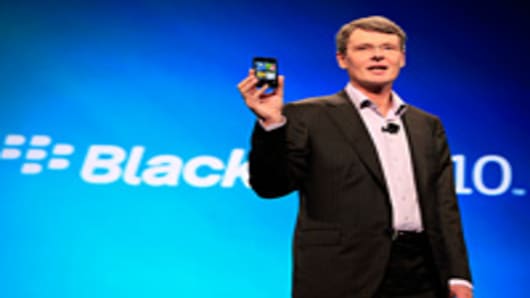First he said RIM didn't need a turnaround, just better marketing. Then he said the problems were worse than he anticipated, and a turnaround was indeed in order.
Lately, he has seemed to settle on both; weeks after he announced alayoff of 5,000 employees, nearly a third of the workforce, he has followed up with assurances to the Canadian Broadcasting Company that RIM might have been a troubled company a few weeks ago, but "there's nothing wrong with the company as it exists right now."
In truth, RIM's path to independent survival — to say nothing of recovery — is dubious at best. Though Heins says RIM is not in a death spiral (and what else could he say?), I've seen them before, and ... let's put it this way: if the tech death spiral were a gymnastics move, RIM would be executing it with Olympic precision.
Andrew Ross Sorkin asked me on Squawk Box this morning what happens next for the company. Here's the hard truth: For RIM to avoid sliding further into irrelevance, its BlackBerry 10 operating system will have to be so revolutionary that it doesn't just compete with iOS and Android, but it makes them irrelevant. Not even RIM is claiming that's going to happen.
Unless RIM can do that, it's stuck trying to sell its legacy BlackBerry operating system for at least three more years while production of BlackBerry 10 devices ramps up. Considering BlackBerry device sales dropped by 40 percent in a year and a half, that's likely to be tough.
email: tech@cnbc.com



